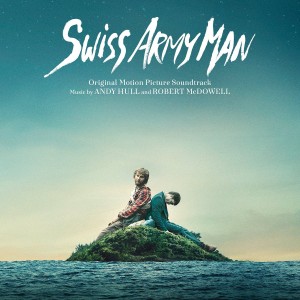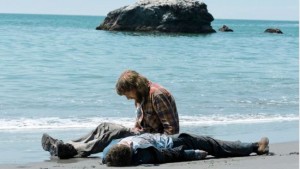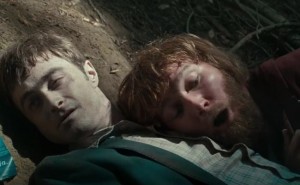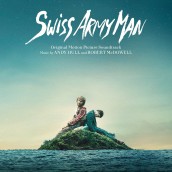
SWISS ARMY MAN composers Robert McDowell (L) and Andy Hull ( R ) | ©2016 Blackbird Films
When you’re marooned on an ocean-lost island, many things come to mind in the madness of utter isolation. For the increasingly suicidal Hank (Paul Dano), it’s the Greek chorus (by way of Polynesian chant) of American composers Andy Hull and Robert McDowell. Their harmonies are full of tuneful lament and poetic irony, vocalese that turns to self-accusing song, all telling Hank to take The Big Dive. But just before he steps over the edge, Hank’s isolation is interrupted by the appearance of the very Manny (Daniel Radcliffe), whose very dead condition doesn’t mean that this can’t become the beginning of a beautiful relationship. Given his own Wilson in corpulent human form, Hank is not only given a chance for imagined conversations, but more importantly the idea to use Manny’s post-mortem bodily functions as a virtual SWISS ARMY MAN to provide a means of long-awaited escape.
Hull and McDowell’s vocals and lyrics chart this oddball relationship with continual invention, not only bringing real emotion out of a seemingly one-sided pair, but also fashioning their voices into a percussive means of escape. Like this absurdist film by video directors Daniel Schienert and Daniel Kwan (aka the “Daniels”), this composing duo have made a strong, first-time cinematic impression that’s quite like anything before it. Where The Swingles Singers gave a wacky sense of A Capella playfulness to such Burt Bacharach scores as BUTCH CASSIDY AND THE SUNDANCE KID, Hull and McDowell take a musical idea that could have made for one-note musical shtick into a true score that sings with emotional beauty. Imagine what Beach Boy Brian Wilson might have thought of to pass the time if he got shipwrecked during his “Pet Sounds” period, and you’ll get an idea of this soulfully unique score whose peculiar raft is strongly constructed out of themes. Now as they make an impressive journey from their membership with the alt. Manchester Orchestra, Hull and McDowell reflect on a singular score of vocal invention that’s as multi-faceted as the SWISS ARMY MAN.

SWISS ARMY MAN soundtrack | ©2016 Lakeshore Records
ASSIGNMENT X: Could you talk about your backgrounds, and vocal training, that led to SWISS ARMY MAN?
ANDY HULL: I have been playing rock shows since I was 15 years old and that eventually led into a career leading the rock band Manchester Orchestra. We produce and perform under several different projects, so the combination of making countless albums and playing thousands of shows was my sort of background for learning how to sing.
ROBERT McDOWELL: Neither of us have had any vocal training. Just lots of moments to figure what you can do with your voice, sounds and production. We have always tried to approach each project with a different method in order to learn new techniques and make music that doesn’t sounds like part 1, 2 and 3. That mindset gave us enough tools to start the soundtrack and then experiment our way through.
AX: How did you come up with the musical premise of SWISS ARMY MAN?
HULL: The Daniels contacted me and asked if I was interested in writing some songs for their first feature. Movies are probably my biggest passion, even above music, so I was more than thrilled. When they told us that they wanted the score to be made with no instruments and almost all human sounds and voices, we were thrilled at the challenge. As far as the musical premise, the first song I wrote, “A Better Way”, was the basis for the entire score. Once we wrote that song and “Montage”, we realized the chords would work perfectly throughout without seeming overused. We tried to focus on 5 or so different melodies in the same key that could all work together and would sound differently depending on which melodies we paired together.
McDOWELL: The Daniels have always had a lot of passion and direction. When they came to us, they already knew they wanted a unique score. We were told we could use sounds that only exist in nature, which left us with vocals and percussion. Over the next year, the premise came into itself. Every few weeks we would find a new sound, emotion or approach that would become one piece of the soundtrack. We tried to let ourselves evolve with each edit or re-write in order to match the premise of the music with the movie.
AX: SWISS ARMY MAN is one of the crazier novelty films since WEEKEND AT BERNIE’S. But was it important to have the score go out of immediately funny territory into becoming an organic part of the movie?
HULL: The movie is obviously funny but I never once thought of it like a comedy while we were making it. It doesn’t really read like a comedy from the script. So the score was a reflection of that. I knew the visuals and heart of the movie were going to be beautiful and organic so we tried to capture that on our end as well.
McDOWELL: From day one, the Daniels wanted the movie to sound and look beautiful. We had to create a bunch of material prior to them shooting, so the actors could sing along. I believe it helps bring the music into the story. There are a few moments where you see the actors singing the score, which help establish that this music is all happening inside of Hank’s head.

SWISS ARMY MAN | ©2016 Blackbird Films
AX: Given that you’re a composing duo, what kind of energy did that give to working with a directing duo? Do you think their rock video background was an asset when it came to creating such a unique score?
HULL: We had worked with the guys before on our music video “Simple Math”, and it was an extremely pleasurable experience and collaboration. In a lot of ways we are very similar to those guys in our hunger to reach further and be better. To be unique and powerful. So when you have guys with a specific thought in mind and we have a specific thought as well, we would work on them over and over until we had uncovered some really beautiful stuff.
McDOWELL: Having a pre-existing relationship made working together very smooth and natural. It grew into a group of friends rather than two different teams. As for their background being an asset, I would have to say absolutely. They are very familiar with pairing movies to music, which helped everyone’s vision. This time we were just reversed, with us creating content for their visual.
AX: It’s been quite a while since we’ve gotten a vocal-based score like SWISS ARMY MAN. Did you ever listen back to Burt Bacharach scores like BUTCH CASSIDY AND THE SUNDANCE KID or A Capella groups like The Swingles Singers?
HULL: We definitely did some research at the beginning, but not with film scores. The Daniels would send over all sorts of videos of tribes from all over the world performing insane vocal compositions. The vulnerability in just letting your voice do crazy and wild stuff is hard to achieve, but once you’re there, the possibilities seem endless. We wanted the score to sound magical and otherworldly, so we tried to be inspired by what we were working and how to reach that sound.
McDOWELL: I have not heard either, but I’ll have to go check it out now!
AX: Did you listen as well to any pop /rock / alt. groups or artists as well for inspiration? There’s definitely a cool Beach Boys / Brian Wilson “Pet Sounds” influence to SWISS ARMY MAN.
HULL: I guess with indie/alt rock being our day job, that is going to naturally show itself. We do love the Beach Boys. It wasn’t a conscious decision, but when we realized one song in particular has a Brian Wilson thing going on, it was exciting knowing that Paul would be able to pull it off. While we were recording the actors’ vocals in LA, it’s funny to tell him, “I hate to say this, but sing this part like Brian Wilson.”
McDOWELL: My dad was a big music fan, so we listened to everything growing up. Those classic records were a big part of my life musically and personally. I can remember moments where I’d listen for the hundredth time and hear a new part. Once your ear starts to hear those hidden, but genius parts, you can become obsessed with trying to create you own. Once we got into the thick of the movie, we had to go back to some of those, but also find inspiration in anything from Frank Zappa to classical arrangements.
AX: In the same way that Hank fashions Manny into a vehicle for his escape, how did you want to create instruments from your voices?
HULL: We had to get very creative to make the album sound dynamic and different. We used a lot of echo, delays and reversed reverb. It took time to put headphones on and just make sounds and hear what could sonically work for the scene. We would usually start with a low octave organ that wasn’t really desirable, other than the note and start slowly adding from there; eventually taking the low organ out and it still sounding full.
McDOWELL: We wanted these songs to sound bigger than a simple choir. When we started, we had no idea what that meant or how to do it. So we started trying things blindly. We tried looping, stacking, sampling voices, hitting delays, etc. and through that, found so many new versions of singing. Once we had the different options, we were able to apply them to the emotion of Manny and Hank.
AX: There’s a beautifully haunting quality that you don’t expect from your score. How did you want your voices to reflect Hank’s isolation? And In a way, do you think the stripped-down quality of the score is more emotionally effective than had an orchestra been used for it?
HULL: I definitely think it’s more emotionally affective because it connects you to the character at an even deeper level. You are listening to his thoughts in music. At times I would have to get into that headspace to sing a certain way. I’d ask, “How is he feeling? Where is he standing? Why would he sing like this?” It was a total blast to sing in character.
It was very tempting to make things polished and beautiful. At times it would be perfect in the studio, but once to picture caused conflicting emotions. The turning point for us was when we carelessly made five or so ideas with a new trick we discovered. It allowed very few voices to fill the entire moment. It managed to match the feeling perfectly – you have one guy alone, in this huge place, struggling but finding hope as he goes.

SWISS ARMY MAN | ©2016 Blackbird Films
AX: Is it particularly tricky to give vocal personality to a dead, expressionless body?
McDOWELL: It took some time! It required us to have zero judgment about what was happening in the room. The biggest problem was that what we were making shouldn’t exist by definition. So we once again had to try things and let it evolve into Manny’s voice. Once the first edit came in things began to speed up. Now Manny had a personality and speaking voice outside the script. We were able to use what Danielle Radcliffe did to mold and shape what we were doing.
HULL: The Daniels had a pretty clear idea that Manny’s voice was going to be clumsy and low from the start. We worked in that arena for his songs. The incredibly talented Daniel Radcliffe really helped bring that character to life in the songs. He had perfected the voice and can sing really well, so it was relatively easy. Luckily for us, he could also sing very well in the higher octaves, which gave “Montage” an extra kick.
AX: How did you want to sample voice into the score? Are there any other instruments in the score beyond them?
HULL: Robert was really genius in that area. He was inventing new tricks everyday. The first 85 percent of the movie there are no real instruments other than our three voices and some drums. Once the movie starts to progress into a more ordinary world (I don’t want to give anything away!), we were allowed to move into more traditional scoring. We still used mostly voices but having full strings, piano, etc., which helped elevate the final reel of the movie.
AX: There’s a particularly funny vocalese salute to JURASSIC PARK here. What inspired that?
HULL: The script had it mentioned in a pretty pivotal moment of the movie so we just went for it. We thought, “Never in 1000 years is John Williams going to let us do this” and sure enough I got a FaceTime call from Daniel Schienart at midnight and he was jumping up and down going “JOHN WILLIAMS LOVED IT!! WE CAN USE IT AS LONG AS THE MOVIE ISN’T RATED X!!”… It was incredible!
McDOWELL: That is a life moment for us now!
AX: How did you want the score to build with the anxiousness if Hank will finally escape the island?
HULL: I think the movie lends itself that way naturally, but as musicians making a large piece of conceptual art, we wanted to make sure it was moving and didn’t ever stall out.
McDOWELL: We just tried to follow the story as much as we could. At times, we would get notes saying that it was too anxious or they edited something and need a new feel. We had a really great back and forth with the Daniel’s through those moments. It was very experimental at times, they would have us try some anxious, sad or tense cues and see what fit best.
AX: How do you think that audiences will react to the film, and your score? And what do you think it shows about the potential of how you can score a comedy that might not have such a crazy premise?
HULL: I think people will be surprised at the sweetness and charm of the movie. As a self-proclaimed “movie freak”, I couldn’t imagine working on a cooler and more inventive movie. From the cast to everyone who worked on the film, it was about as special as it could be. I can’t ever worry about what audiences will say about the score. I know I tried as hard as I possibly could to create something really special and unique and I have to leave it at that.
McDOWELL: I think it’s an incredibly unique film and everyone should see it. The film forces people to think and react to emotions and some people might not enjoy that. But for me, that’s what art is.
AX: Do you think that a soundtrack like SWISS ARMY MAN is something that only first time composers could come up with? And can we expect anything more conventional from you in the future. Would you even want to be?
HULL: I imagine that composers of all sorts could do this sort of thing. I know it wouldn’t sound like ours, but that’s the beauty of it. I do know that our background and history in music played a big part, but we have always wanted to intertwine large orchestral ideas into our rock band; so having to strip it all away and do it with my voice was the best challenge we could ask for. We would love to score more movies if the right movie and opportunity arrives, but our main goal for the next year is to record a new album for Manchester Orchestra.
McDOWELL: I don’t think we could create this soundtrack again if we tried. It would have to be something slightly different because so many of these moments came from experimenting. I would love to do another movie but for me the best part is being able to experiment and try new ideas.
“Swiss Army Man” opens in theaters, with Andy Hull and Robert McDowell’s score available from Lakeshore Records HERE
Visit The Manchester Orchestra’s website HERE
Follow us on Twitter at ASSIGNMENT X
Like us on Facebook at ASSIGNMENT X
Article Source: Assignment X
Article: Interview with SWISS ARMY MAN vocalists Robert McDowell and Andy Hull
Related Posts:











